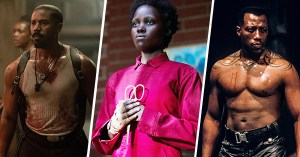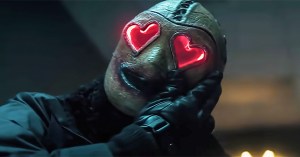Five Favorite Films with Bob Balaban
Plus, the actor, writer, director and Moonrise Kingdom narrator on working with Wes Anderson, directing kids, and his memories of Steven Spielberg's Close Encounters.
Droll, erudite and extremely affable, Bob Balaban is the kind of guy you could spend hours listening to — which is probably why Wes Anderson cast him as New Penzance’s all-purpose meteorologist narrator in his latest hit, Moonrise Kingdom. Balaban’s own career as an actor, writer and director goes way back, and via many curious avenues: He made his debut in the classic Midnight Cowboy, has worked with the likes of Woody Allen, Ken Russell and Christopher Guest, and famously appeared as François Truffaut’s interpreter in Spielberg’s Close Encounters of the Third Kind. He’s also directed and produced film and TV, appeared in theater, and been the NBC executive responsible for sinking Seinfeld — on TV, anyway. With Moonrise Kingdom expanding nationally this week, sat down for a talk with Balaban about the film, his experience working with Wes Anderson, and much more. During the course of the interview, he also talked about five of his favorite films.
La Ronde (Max Ophüls, 1950; 100% Tomatometer)
Well I always have a hard time with this. As we get older or grow or whatever, it’s always changing, because you just see more movies, for one thing, so you change. One of my most favorite movies, I think a perennial favorite movie of mine is La Ronde. I don’t know how well acquainted you are with it. It’s one of my favorite movies. Anton Walbrook is one of the stars, who also the stars of another one of my favorite movies, The Life and Death of Colonel Blimp. He’s the guy who’s that German who has the seven-minute monologue with the moving camera that never cuts, and he breaks down during it.
The Life and Death of Colonel Blimp (Michael Powell and Emeric Pressburger, 1943; 95% Tomatometer)
Those are two favorites of mine.
Colonel Blimp really is something else, isn’t it?
Yeah — and I was surprised. I didn’t think I’d love it. I saw pieces of it and I kept avoiding watching it, because it seemed so artificial and I didn’t get the acting style, but when I watched the whole movie I just thought it was the most amazing movie. I loved it. And Deborah Kerr was just great. I always liked her, but she was just fantastic in this.
The Palm Beach Story / The Miracle of Morgan’s Creek (Preston Sturges, 1942/1944; 100/90% Tomatometer)
I do like… I’m a big Preston Sturges fan. I like all of them, but I especially like, probably Palm Beach Story, and Miracle at Morgan’s Creek is one of my favorites. I happen to love it. I think it’s maybe one of my favorite… 20 movies, ’cause there’s so many great things.
The Lives of Others (Florian Henckel-Donnersmarck, 2006; 93% Tomatometer)
Another foreign film was probably The Lives of Others. I thought that was pretty great.
E.T. The Extra Terrestrial (Steven Spielberg, 1982; 98% Tomatometer)
I love E.T., you know. I think E.T. ‘s great. Those scenes with the kids are quite amazing.
Some of the greatest direction of kids there, that’s for sure.
And that’s not an accident. He’s been consistent, Steven, in his whole career doing that.
Next, Balaban on working with Wes Anderson on Moonrise Kingdom, directing kids and his memories of Close Encounters of the Third Kind.
[Balaban looks over some of the Moonrise Kingdom promotional items.]
They always have good promotional things for Wes Anderson movies.
Bob Balaban: It’s funny — I saved a few things from Gosford Park, ’cause as a producer we had the promotional materials. We had the strangest promotional materials. And Catch-22, which was the first movie I was in — well along with Midnight Cowboy, but we didn’t get anything on that; I mean, what would it have been? Used condoms? [Laughs] But on Catch-22 we all got this amazing silver key chain. I remember it vividly: it had the logo of the movie done in a silver disc with this most gorgeous key chain, and I had it for so long that the disc eventually fell off from the key chain.
It does pay to hold on to stuff, sometimes. Well, congratulations on the film. I very much liked it.
Thank you.
I’m sure nobody tells you how much they didn’t like it.
[Laughs] Well sometimes they do, but they don’t at a junket.
Well, I’m not just saying that; I genuinely loved it. I’m a fan of Wes.
I am too. And now I’m even more of a fan, because to watch him do what it is that he does to get those movies that you love so much — he is all the time exhibiting all the traits, as a director, that you’ve come to admire in his movies. His movies and Wes, they’re like one and the same. And it’s very satisfying to see that.
You have an amusing role: the omniscient narrator, presiding over the story.
Yeah, I guess you could say it’s like the narrator, or the stage manager in our town. I just knew that it was a tradition in Wes’s movies that he often did have a narrator, so I was very happy to occupy it — “Oh, I have a place in his vocabulary.” I was very happy to be the narrator. And I knew that it was likely that I wouldn’t get cut. [Laughs] I also knew that, like all the parts in this movie, there are no small parts in a Wes Anderson movie. I felt like I had a small but really nice, secure thing to be in the movie. I enjoyed being both the commentator and then sometimes being a character in it as well.
You’re almost an instrument in the film’s orchestra.
Yes. I also think that some part of the narrator — which I didn’t think of too much actively when I was doing it — but at some point I thought, “This movie is really a book.” Moonrise Kingdom is the sixth book in what Kara’s character carries around with her in her little satchel of children’s books. So I think those kinds of books have first person narrators who also appear in the story, and I think of this as a sort of literary conceit that I thought worked very nicely on the page; and when I see the movie, I think Wes made great choices about that.
Yours is a distinct and recognizable screen presence. Why did you think Wes approached you for this part?
Oh I have no idea. [Laughs]
He must have been a fan; I mean, you’re a fan of his.
I’m a fan of his. I knew him, enough to say “Hello” a couple of times but I didn’t really know him. I guess as writers and directors do. I certainly do it when I’m planning to direct something. I’m always making lists of “Who can I think of that I haven’t seen in a little bit?” or “Who somehow has some great similarity to this thing that I’m doing, but that they haven’t done it before?” I guess I came to Wes’s mind. Thank god — that’s how we get jobs.
He does appear to have a very specific list, in terms of his cast.
Yeah. Well I certainly hope I end up being cast in another Wes Anderson movie.
He reuses the same people, so you could be in.
I know. But he can’t keep expanding, otherwise the cast will be so big. But I’d find it very gratifying to work with him again.
His movies, especially this one, have very rigorous formal structures. What’s it like acting under that kind of direction?
Well in my case, I didn’t have that many marks to hit. [Smiles] It was, “Stand there, put your foot there on the rock, and I’ll go over here.” But, as in all life, sometimes the very things you would think would make somebody not be good at the thing that they’re doing — for instance, an obsessive attention to clothing and scenery and stuff — in Wes’s case, it has a whole different form and it takes on a whole different meaning, because he does create a world in all of his movies. They’re all different worlds, but you can tell they all come from the same creator. Most people don’t make movies that way. There are very few people who do: there’s similarities, there’s shooting style, but there’s something about Wes that is deeply ingrained in his movies, and instead of making the same movie all the time — they may feel similar, but they have different themes, very different strengths, and the characters are really very remarkably different in all of these movies; and I thought that especially in Moonrise Kingdom.
One of the pleasures I find in seeing the movie — ’cause when you’re in a movie there’s one kind of pleasure, and it was very fun to be in this movie — but watching the movie, the pleasure of seeing the stuff that you don’t [initially see], that you are not being made aware of all the time, is to me one of the strongest parts of the movie. And it exists because it’s existing in such a rigorous structure. I think Moonrise Kingdom has a very, very strong emotional current and a very strong core in it about love and disappointment and youth and, I mean there’s so many fun ways to analyze this movie when you see it. Because I did, and I think most audiences have a very powerful reaction to it. At first when you see the movie you might think it’s sort of a trifle: It’s fun, it’s beautiful to look at, the characters are funny. It’s sort of a romp, you could say, and I think it’s popularity is somewhat derived from that; but on the other hand, it’s a very deep and rather profound movie, and all the more profound because it’s a bit of a wolf in sheep’s clothing, you know. It sort of dares you to get involved with it, and then you really get involved with it. I was amazed from the first time I saw the movie at how invested I was, in the children and the adults: in the adults’ rather sad but understandable lives, and the purity and just the passion of those two little, both outcast children. I was just amazed that a movie that had that formal structure could have that kind of emotional life to it.
Agreed. It’s a synthesis of style and content that he does so very well.
Yes. And also, I don’t think it’s a choice Wes makes. I think that he, at some point, he just made what was in his heart, and he just keeps making it over and over again. But it’s also different in that there’s enough you really do feel — I mean that’s why they call it the auteur [theory], or whatever it is — it’s because you really get to know somebody. And it’s not — there’s no easy answer to what makes it. There is a surface to a Wes Anderson movie, you could say that’s why it’s a Wes Anderson movie, but really it’s a Wes Anderson movie because he subconsciously and consciously infuses every frame of the movie — yes visually, yes emotionally, and yes in the text; he infuses it with his unique vision of life. It’s so specific. And I think that’s what we crave in all art forms; something that’s so specific that you can identify with it, because it’s so specific. It’s the general stuff that can’t identify with, because it doesn’t engage you as much as one person’s vision –which isn’t your vision, but somehow you’re able to connect with it.
You’ve said almost everything I needed to say about it. I think the interview’s over.
[Laughs]
You’ve worked with many interesting actors and directors, and one that comes to mind I’m sure for a lot of people is François Truffaut in Close Encounters of the Third Kind.
Yes, one of my favorite directors.
Did Wes ask you about working with him — given what a great admirer he is of Truffaut?
I don’t know that we did talk about it. But I wrote a book about the making of the movie.
That’s right, yes — I mean to read it.
It’s kind of — it’s fun, you know. It’s very specific, because it’s sort of my impressions. It’s a small actor’s view of what it’s like to be in a really big movie. [Laughs] So it’s sort of from the ant’s point of view, I would say. But I don’t think we talked about it. I try to guard against telling too many anecdotes because I’m not very good at them, and it’s really boring to be with people who are all, “Oh yes, and then in 1968 this happened,” you know—
[Laughs] I think we’d need another few hours to through the anecdotes you have.
Well not all of them are that interesting. But Close Encounters was extremely interesting and very easy and fun to write about. Also, I liked everybody so I had nothing bad to say, which I would never write about anyway. It was a really interesting experience, and I think for people who love the movie — I think it’s survived and it’s still kind of a classic — I trust it’s fun for them to see the nuts and bolts of the scenes that were caught; what it was like working with [child actor] Carey Guffey, who was so amazing, and what’s it like to have a four-year-old in a movie. In many ways there are definite similarities between [Steven] Spielberg and Wes — if only talking about their affection, respect, and ability to understand and deal with both children and child actors; ’cause they really are both fabulous at that, and an awful lot of directors cannot deal with children. You know, having a child in a movie is like — a movie’s all about precision, and getting somebody to do what you need and want, and Can they do 15 takes, and will they match what they’re doing? And the beauty of children is that, when they’re well used, they’re unpredictable, hopefully — or at least they give the impression of that. And I know watching Wes work with these two kids — granted they were 12, they weren’t four, but there was the same kind of affection, respect, and not talking down; the idea that if you treat a child like they’re equals, they respond accordingly. He was great with kids, and I think the kids were great in the movie. As I do think the kids in Steven’s movies are uniformly fantastic.
It’s a very difficult kind of film to get right, isn’t it — the adolescent romance.
Yes, and very Truffaut like, I think. Very French, in way.
Wes talked about Small Change a bit, which is a great film.
Yes.
When it comes to getting great performances from kids, how much of it do you think is successful casting, and how much of it is in the directing?
Well I think it’s both. It’s an instinct and an ability, ’cause kids, you know, kids don’t memorize lines too well. I directed — have we talked about this? I directed a movie called Parents—
It’s funny you mention it, because it always comes up in my Netflix recommendations of “Things you may like?”
[Laughs] Oh. Because you’re strange. [Laughs] I wish I could say it’s some kind of perfect, great movie. But it’s really interesting and the lead is a nine-year-old boy, Bryan Madorsky, who had never acted before — so that whole issue of casting a leading role in a movie with a child, I was confronted with it immediately. There was nobody I knew who was a famous nine-year-old actor who would be right for this part of a very mysterious, withdrawn kind of disturbed little boy. You can’t act that, exactly. And the first couple of days we saw like 75 million children, all of whom had done Wonder Bread commercials recently, so they were all cheerful — they all fit a certain mold, because child actors who work a lot, work a lot because they’re sort of a type. And I wanted the anti-type person. So at some point I said, “This may seem radical, but I don’t think we need a child who can memorize lines ore is experienced.” And this one kid came in and he sat down, like you could just tell he was fabulous and interesting. I like kids and I probably knew enough to know that you try to find what they do best, and have that be what they do in the movie. I would say to Bryan, “Just say whatever you think you should say,” so he always seemed natural. The only thing he had trouble with was one scene — [laughs] — where he had to hit his father with a baseball bat.
I’m going to watch Parents and finally read your Close Encounters book.
.
Well you have a whole assignment!
Moonrise Kingdom expands nationwide in theaters this week.






